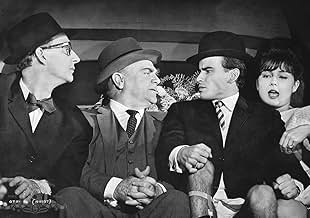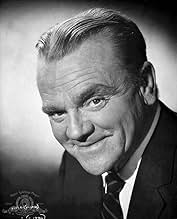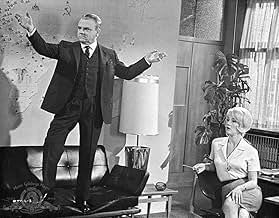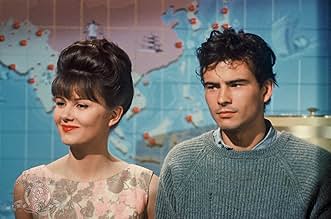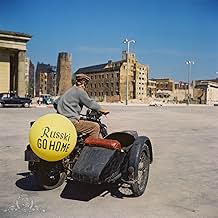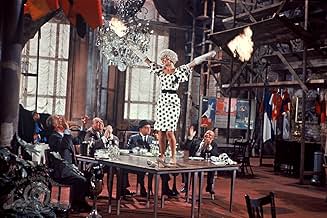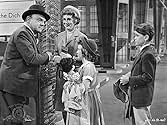A Berlino Ovest durante la Guerra Fredda, un dirigente della Coca-Cola ha il compito di prendersi cura della figlia del suo capo.A Berlino Ovest durante la Guerra Fredda, un dirigente della Coca-Cola ha il compito di prendersi cura della figlia del suo capo.A Berlino Ovest durante la Guerra Fredda, un dirigente della Coca-Cola ha il compito di prendersi cura della figlia del suo capo.
- Regia
- Sceneggiatura
- Star
- Candidato a 1 Oscar
- 1 vittoria e 8 candidature totali
- Fräulein Ingeborg
- (as Lilo Pulver)
- Melanie Hazeltine
- (as Lois Bolton)
- Krause
- (voce)
- …
- Cindy MacNamara
- (non citato nei titoli originali)
Recensioni in evidenza
The talk is fast-paced. The humor is broad and full of Wilder wordplay. Cagney is an unrelenting engine. He is buzzing with energy and I half-expected him to explode in song and dance. The machine gun dialog is non-stop and can get tiring at some point. This is a feat of performance from the great Cagney.
The story concerns an American Coca-Cola executive, C.R. McNamara, heading up an office in Berlin who is asked by his boss to host his daughter (Pamela Tiffin). Hoping for a plum assignment in London, C.R. and his wife (Arlene Francis) welcome the young woman with open arms. She's southern, beautiful, flirtatious, and before they know it, she's got a Communist boyfriend (Horst Bucholz) Then he becomes her Communist husband, and that London promotion is looking less and less likely unless C.R. can pull off a miracle.
Wilder's direction for this was to have the dialogue shouted rather than spoken and to keep the film moving at a very fast pace. Admittedly this can get a little exhausting. Cagney gives a high-voltage performance and is extremely funny as the harried executive. And there are some hysterical bits as well as the madcap feeling of a '30s film. The rest of the cast is wonderful: Arlene Francis as C.R.'s long-suffering wife, Lilo Pulver as C.R.'s sexy secretary, and Hanns Lothar as Schlemmer, C.R.'s assistant who was "underground" during the war. ("The resistance?" "No, the subway. Nobody told me anything down there.") Though this was not a happy set - Wilder and Cagney had their differences, and Horst Buccholz was a major pain - the result is very good. Late in their careers, Wilder and Cagney still had it. Big time.
From the time you hear the first few bars of "The Sabre Dance" thru the final shot of James Cagney, you are on a constant roller coaster, and you don't want to get off. It is a manic, wild movie that never disappoints or lets down.
The engine that drives this lunacy is James Cagney. In one of his best, funniest and energetic performances, he is nothing short of amazing. He is a whirling dervish, at the heart of a storm that he has no control over. I don't want to give any of the story away, suffice to say that he is nothing short of spectacular. In Cameron Crowe's book on Billy Wilder, Wilder laments that Cagney was so loud and energetic at the start of the film, that his character really has nowhere to go, in terms of building, and reacting to the chaos. I would agree with that assessment, but Cagney's performance does not let the audience stop and catch it's breath long enough for this to really be a factor.
Wilder and Diamond have brought us another gem. Is there another writing team that within a span of three years, have created three better pictures than the ones they have given us (Some Like It Hot, The Apartment, One,Two,Three)? I doubt it.
Kudos all around to the supporting cast as well. Especially, Arlene Francis, as Cagney's wife, and Lilo Pulver as his secretary. Also watch for some "inside" jokes. Like when Cagney threatens Horst Buchholz with a grapefruit, and Red Buttons, in a cameo, doing a Cagney imitation.
Great fun from start to finish. 10/10
It's one of those movies in which the gags would be spoiled if they were described to a person who hadn't yet seen the film. For the most part they are tied closely to the plot and often build on one another. But I'm compelled to give one example. Cagney is an executive in Berlin and his first-hand man is Schlemmer. Schlemmer has a habit of clicking his heels before and after addressing Cagney. At one point Cagney chews him out and asks him, "just between us," what Schlemmer did in the war. "I was in the underground," says Schlemmer. "Oh, the resistance?" "No, the underground. The subway. I was a conductor." Cagney says supiciously, "And I suppose you never were a supporter of Adolf." Schlemmer: "Adolf who? You see, I was always in the underground. They never told us anything down there."
The dialogue is shouted rather than spoken. Heels are clicked, people leap to attention, fingers are snapped, orders are flung about. The only person who doesn't run around frantically is Lilo Pulver who does not have to run to attract anyone's attention. She can simply stand still and get the job done. She's Cagney's secretary and tells him she's thinking of getting a job elsewhere as a translator. "Don't forget I am bilingual." "Don't I know it," Cagney mutters ruefully.
But I won't go on because I'll just wind up giving away more gags. Check the trivia entries too. This was Cagney's last major role and one of Wilder's best comedies. It's simply hilarious and not to be missed.
For what was and what should have remained his swan song to the world of film James Cagney heads the cast in this. He's the man in charge of Coca-Cola's operations in Germany which is headquartered in West Berlin and he's had a lovely little present dumped in his lap. The daughter of the CEO of Coca-Cola is in Europe and now she's in Germany and he's expected to watch out for her. The daughter is played by Pamela Tiffin and she is one of the biggest airheads ever portrayed on the screen. She's fallen big time for a German kid played by Horst Bucholtz. They've gotten married.
Bucholtz is a kid who's real good at spouting all kinds of left wing slogans without delving to deeply into their meanings. He's a Communist and that drives Cagney nuts and if it drives Cagney nuts, Tiffin's father is sure to go over the top. Cagney takes it upon himself to get Bucholtz arrested on the East Berlin side as an American spy.
Of course a small memento of their married life has developed inside Tiffin so now Cagney has a real problem. He's got to get Bucholtz back and turn him into a money grubbing capitalist in his image. The frantic pace at which this is attempted, racing against the clock when Tiffin's father played by Howard St. John arrives in Berlin is what the rest of the film is about.
Wilder has a ball reducing the Cold War to its basic absurdities. The USA is symbolized by James Cagney who thinks the whole world will become America if only enough Coca-Cola is peddled. Cagney comes real close to proving it so.
The Communists come out far worse. Karl Marx's world always looked nice on paper, but always has had a real problem being converted into a functioning state. The Russians are also good at spouting the party line, but in One, Two, Three, Wilder shows how very easily they can be influenced by some of life's most elemental things and I don't mean Coca-Cola.
Cagney did not always get along with Wilder, but both men were professional enough to bury certain creative differences. Cagney was kind and patient with Tiffin who was getting her first real break in film. However he grew to positively loath Horst Bucholtz. In his memoirs which came out in the 1970s, Bucholtz was the only colleague who Cagney had anything really critical to say about.
During the middle of the film being shot, the Russians stopped the flow of traffic from West and East Berlin. Some shots had to be redone around the Brandenburg Gate, a whole set had to be constructed. I suppose a well trained cinema professional could spot the shots where the real and the fake Brandeburg were used. I sure can't. The following year, the Berlin Wall was built, so Wilder got his film done just in time.
Arlene Francis plays Cagney's exasperated wife and she of What's My Line does just fine. Cagney made an appearance on that show just before shooting started and gave the picture a big old plug.
The laughs come pretty fast and furious as James Cagney struggles mightily to prevent the arrival of "another bouncing, baby, Bolshevik."
Lo sapevi?
- QuizThe film recorded a loss of $1.6 million. It didn't do well at either the U.S. or German box office because the story felt much more sinister in 1961 when the Berlin Wall was erected.
- BlooperSchlemmer calls his former superior officer in the SS "Herr Oberleutnant". The SS had no rank of Oberleutnant nor did its members call each other Herr. Oberleutnant was a German Army rank. The corresponding SS rank was Obersturmführer. In the German (dubbed) version, Schlemmer correctly addresses him as "Obersturmführer".
- Citazioni
Borodenko: When will papers be ready?
C.R. Macnamara: I'll put my secretary right to work on it.
Mishkin: Your secretary? She's that blonde lady?
C.R. Macnamara: That's the one.
Peripetchikoff: [after conferring with the others] You will send papers to East Berlin with blonde lady in triplicate.
C.R. Macnamara: You want the papers in triplicate, or the blonde in triplicate?
Peripetchikoff: See what you can do.
- ConnessioniEdited into Grand format: Amérique, notre histoire (2006)
I più visti
- How long is One, Two, Three?Powered by Alexa
- Why is it named One, Two, Three?
- What does MacNamara say about alligator shoes offered as possible executive attire for Otto?
- Lilo Pulver---Who Was She?
Dettagli
Botteghino
- Budget
- 3.000.000 USD (previsto)
- Lordo in tutto il mondo
- 146 USD
- Tempo di esecuzione1 ora 44 minuti
- Colore
- Proporzioni
- 2.35 : 1
Contribuisci a questa pagina



